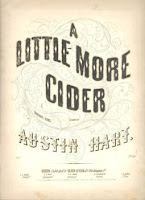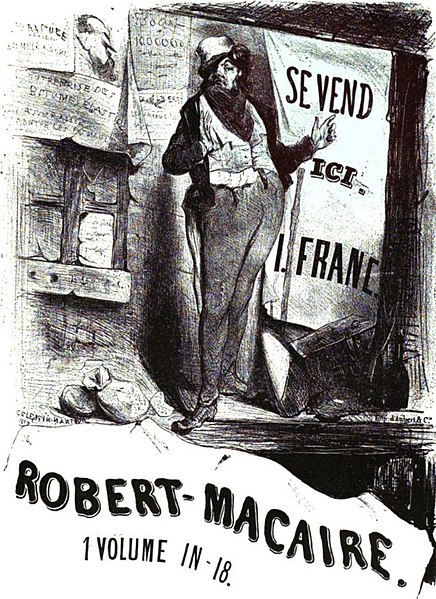 |
| Montana cowboys, c1910 |
These are from Harry Leon Wilson’s The Lions of the Lord. Once again, I struck out on a few. If anyone has a
definition for “grass stomach,” “composition tea,” “chitcup,” or “on the bark,”
leave a comment below.
baize = a bright green fabric napped to resemble felt; used
to cover gaming tables. “The little man arose and came hesitatingly forward to
the baize-covered table that served as a pulpit.” Harry Leon Wilson, The
Lions of the Lord.
beat the cars =
to surpass in every way. “And her
paw—though Lord knows who her maw was—a-dressing her to beat the cars.” Harry
Leon Wilson, The Lions of the Lord.
beau catcher =
a small flat curl of hair worn on the
temple. “My mother was making a company for me, putting up my waterfall and
curling my beau-catchers.” Harry Leon Wilson, The Lions of the Lord.
blind = of a way or path that is confusing, uncertain. “You
have to take a long squint, like when you’re in the woods on a path that ain’t
been used much lately and has got blind.” Harry Leon Wilson, The Lions of
the Lord.
cavayard =
a group of saddle horses, remuda. “They’d
go right out and make Amalon look like a whole cavayard of razor-hoofed
buffaloes had raced back and forth over it.” Harry Leon Wilson, The Lions of
the Lord.
daystar = the morning star, the sun. “It was his day-star and
his life, the one pleasure that brought no suffering with it.” Harry Leon
Wilson, The Lions of the Lord.
Dick’s hatband =
anything improvised, makeshift. “Of
course, he’s closer than Dick’s hat-band, but she’ll have the best there is
until he takes another.” Harry Leon Wilson, The Lions of the Lord.
Dutch gilt paper =
a type of highly decorative papers that
were printed by means of blocks of wood or metal, or by engraved rollers, and
dusted with gold. “She was taught these verses from a little old book bound in
the gaudiest of Dutch gilt paper.” Harry Leon Wilson, The Lions of the Lord.
 |
| Caroline Norton |
“Fair Bingen on the Rhine” = a sentimental poem by
British poet Caroline Norton (1808-1877) about the death of a soldier in
Algiers. “By his side was his wife, Amelia, the reigning favourite, who could
play the piano and sing ‘Fair Bingen on the Rhine’ with a dash that was said to
be superb.” Harry Leon Wilson, The Lions of the Lord. Full text here.
froe / frow =
a cleaving tool for splitting thick pieces
of wood into thinner slabs, used for making wooden roof shingles. “I had my
mallet and frow up there two days now, just beyond the lower dry-fork,
splitting out shakes for my new addition.” Harry Leon Wilson, The Lions of
the Lord.
gamboge = a gum resin used as a purgative. “If I’m sick and
have to depend on myself, all right. I’ll dose up with lobelia or gamboge.”
Harry Leon Wilson, The Lions of the Lord.
go to hell across lots =
a curse sending someone directly to
eternal punishment. “He was ready to ‘usheathe his bowie knife’ and send
apostates ‘to hell across lots.’” Harry Leon Wilson, The Lions of the Lord.
“Gone With the Gypsy Davey” = a traditional ballad
about a married woman who takes a gypsy lover. “Tonight I shall lie on the
cold, cold ground / In the arms of a Gypsy Davy-O!” Harry Leon Wilson, The
Lions of the Lord. Listen to Woody Guthrie sing it.
J. Murphy =
a very large covered wagon developed by
Joseph Murphy of St. Louis, used by freighters on the Santa Fe Trail. “They’re
coming back light, and we can have a J. Murphy that is bigger than a whole lot
of houses in this country.” Harry Leon Wilson, The Lions of the Lord. Learn more here.
lapstone =
a stone held in the lap for beating or shaping leather in the making of shoes. “At every halt of the wagons
a shoemaker would be seen searching for a lapstone.” Harry Leon Wilson, The
Lions of the Lord.
 |
| From Leaflets of Memory, 1846 |
Leaflets of Memory = an annual
illustrated anthology of verse and prose. “And there was her book; not the book
of Mormon, but a secular, frivolous thing called ‘Leaflets of Memory, an
Illuminated Annual for the Year 1847’.” Harry Leon Wilson, The Lions of the
Lord. View example here.
lickety-brindle =
very fast. “They fuss through a chapter
here and there, and rush lickety-brindle through another.” Harry Leon Wilson, The
Lions of the Lord.
 |
| Sheet music, 1853 |
“Little More
Cider, A” = a popular 19th-century song, published in 1853. “In
the early days of the march they sang with spirit, to the tune of ‘A Little
More Cider,’ the hymn of the hand-cart written by one of their number.” Harry
Leon Wilson, The Lions of the Lord. Full lyrics here.
lobelia = an herbal remedy for respiratory conditions such as
asthma, bronchitis, pneumonia, and cough; also called Indian tobacco. “If I’m
sick and have to depend on myself, all right. I’ll dose up with lobelia or
gamboge.” Harry Leon Wilson, The Lions of the Lord.
Macaire, Robert =
an archetypal villain, appearing in
popular melodramas and comic opera in the 19th century. “More fondly did she
recall two wonderful evenings at the theatre. First had been the thrilling
‘Robert Macaire’.” Harry Leon Wilson, The Lions of the Lord.
play the hob =
to do something devilish or cause trouble
for someone or something. “It weakens the spirit, and it plays the very hob
with the women.” Harry Leon Wilson, The Lions of the Lord.
 |
| Sappers, 1916 |
sapper = a soldier who digs trenches to undermine
fortifications or builds and repairs them. “They went down the Weber, then
toward East Cañon, a dozen of the bearded host going forward with spades and
axes as sappers.” Harry Leon Wilson, The Lions of the Lord.
scratch gravel =
to work hard, leave in a hurry. “The rest
of the two thousand men on Ezra Calkins’s pay-roll would come hanging around
pestering you all with Winchesters. They’d make you scratch gravel, sure!”
Harry Leon Wilson, The Lions of the Lord.
sent over the rim of the basin = a
19th-century Mormon euphemism for taking the life of someone who was out of
favor with church authority. “Any informer was to be ‘sent over the rim of the
basin’—except that one of their number was to make a full report to the
President at Salt Lake City.” Harry Leon Wilson, The Lions of the Lord.
sideline =
a line for tying together the fore and
hind legs on one side of an animal. “Just picket him or hobble him with a good
side-line.” Harry Leon Wilson, The Lions of the Lord.
surround =
a method of hunting wild animals by
driving them into a trap. “Did you make that surround you was going to make,
Rool?” Harry Leon Wilson, The Lions of the Lord.
sweeny = atrophy of the shoulder muscles in horses. “Well,
now, since these valleys of Ephraim have got a little fattened a whole lot of
us have got the sweeny.” Harry Leon Wilson, The Lions of the Lord.
taglock = a matted lock of wool or hair. “This is a large
flock of sheep that has come up into this valley of the mountains, and some of
them have got tag-locks hanging about them.” Harry Leon Wilson, The Lions of
the Lord.
unbolted flour =
unsifted flour containing all parts of the
grain kernel. “No more homespun for ’em, no more valley tan, no more parched
corn for coffee, nor beat molasses nor unbolted flour.” Harry Leon Wilson, The
Lions of the Lord.
wady = dry riverbed. “I worked in the other direction by
spells till I got to a little wady.” Harry Leon Wilson, The Lions of the
Lord.
warped up =
disturbed, bent out of shape. “He had a
plumb ornery fighting look in them deep-set eyes of his, and blame me if I
didn’t someway feel sorry for him,—he’s that warped up.” Harry Leon Wilson, The
Lions of the Lord.
| Chignon, c1898 |
waterfall =
a chignon; a hairstyle with hair pinned
into a knot at the nape of the neck; also a wave of hair falling down the neck.
“My mother was making a company for me, putting up my waterfall and curling my
beau-catchers.” Harry Leon Wilson, The Lions of the Lord.
whacker = a shortened form of bullwhacker. “I told them I’d be
back with the whackers if I didn’t find you.” Harry Leon Wilson, The Lions
of the Lord.
 |
| Two men with whipsaw, c1896 |
whipsaw = a saw with a narrow blade and a handle at both ends,
used typically by two people. “Late in October there was finished for him on
the outer edge of the town, near the bank of a little hill-born stream, a roomy
log-house, mud-chinked, with a water-tight roof of spruce shakes and a floor of
whipsawed plank.” Harry Leon Wilson, The Lions of the Lord.
wrong side of the blanket = born out of wedlock.
“I was aiming to save her to a crown of glory,—a girl that’s thought to have
been born on the wrong side of the blanket!” Harry Leon Wilson, The Lions of
the Lord.
York shilling =
a monetary unit used for currency in New
York before introduction of the dollar in 1792; worth about 12.5 cents. “Not a
York shilling of my money could they have for such persuasions of Satan.” Harry
Leon Wilson, The Lions of the Lord.
Image credits:
Wikimedia Commons
Coming up: Monte
Walsh (1970)

I've heard "Dick's hat band" several times before, but in a different context— somebody being called as queer or odd as Dick's hat band. I took it to mean eccentric.
ReplyDeleteThe meaning is not dissimilar, Elisabeth. Something makeshift is more than likely going to appear odd or eccentric.
DeleteI used "froe" in the novel I'm writing about logging in Idaho during World War I, when I had a woman homesteader split shingles for the roof of her root cellar (yes, they had roofs). I can't find grass stomach, but I wonder if it refers to bloat in cattle or horses from eating wet grass. Why, oh why did I get rid of my 1917 enormous Websters Dictionary - those words are probably in it. This is fun; I guess I'll have to go back through your previous Old West Glossaries.
ReplyDeleteseen Baize before but didn't know what it meant. Daystar is not uncommon in fantasy as well.
ReplyDeleteThe Navy used "chits" all the time, like you had to fill out a pay chit, liberty chit, etc. Maybe a chitcup was where you put it for someone to draw from. The Navy ones you would put it in a box in the ship's office or give it to your superior.
ReplyDeleteOscar, I get the idea from the context in the novel that it's an Indian word.
Delete